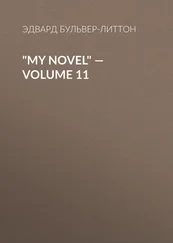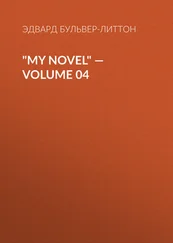Эдвард Бульвер-Литтон - My Novel — Complete
Здесь есть возможность читать онлайн «Эдвард Бульвер-Литтон - My Novel — Complete» — ознакомительный отрывок электронной книги совершенно бесплатно, а после прочтения отрывка купить полную версию. В некоторых случаях можно слушать аудио, скачать через торрент в формате fb2 и присутствует краткое содержание. Жанр: foreign_prose, literature_19, Европейская старинная литература, foreign_antique, на английском языке. Описание произведения, (предисловие) а так же отзывы посетителей доступны на портале библиотеки ЛибКат.
- Название:My Novel — Complete
- Автор:
- Жанр:
- Год:неизвестен
- ISBN:нет данных
- Рейтинг книги:5 / 5. Голосов: 1
-
Избранное:Добавить в избранное
- Отзывы:
-
Ваша оценка:
- 100
- 1
- 2
- 3
- 4
- 5
My Novel — Complete: краткое содержание, описание и аннотация
Предлагаем к чтению аннотацию, описание, краткое содержание или предисловие (зависит от того, что написал сам автор книги «My Novel — Complete»). Если вы не нашли необходимую информацию о книге — напишите в комментариях, мы постараемся отыскать её.
My Novel — Complete — читать онлайн ознакомительный отрывок
Ниже представлен текст книги, разбитый по страницам. Система сохранения места последней прочитанной страницы, позволяет с удобством читать онлайн бесплатно книгу «My Novel — Complete», без необходимости каждый раз заново искать на чём Вы остановились. Поставьте закладку, и сможете в любой момент перейти на страницу, на которой закончили чтение.
Интервал:
Закладка:
“That’s really a sweet little dog of yours, Jemima,” said Mrs. Dale, who was embroidering the word CAROLINE on the border of a cambric pocket handkerchief; but edging a little farther off, as she added, “he’ll not bite, will he?”
“Dear me, no!” said Miss Jemima; “but” (she added in a confidential whisper) “don’t say he,—‘t is a lady dog!”
“Oh,” said Mrs. Dale, edging off still farther, as if that confession of the creature’s sex did not serve to allay her apprehensions,—“oh, then, you carry your aversion to the gentlemen even to lap-dogs,—that is being consistent indeed, Jemima!”
MISS JEMIMA.—“I had a gentleman dog once,—a pug!—pugs are getting very scarce now. I thought he was so fond of me—he snapped at every one else; the battles I fought for him! Well, will you believe—I had been staying with my friend Miss Smilecox at Cheltenham. Knowing that William is so hasty, and his boots are so thick, I trembled to think what a kick might do. So, on coming here I left Bluff—that was his name—with Miss Smilecox.” (A pause.)
MRS. DALE (looking up languidly).—“Well, my love?”
MISS JEMIMA.—“Will you believe it, I say, when I returned to Cheltenham, only three months afterwards, Miss Smilecox had seduced his affections from me, and the ungrateful creature did not even know me again? A pug, too—yet people say pugs are faithful! I am sure they ought to be, nasty things! I have never had a gentleman dog since,—they are all alike, believe me, heartless, selfish creatures.”
MRS. DALE.—“Pugs? I dare say they are!”
MISS JEMIMA (with spirit).-“MEN!—I told you it was a gentleman dog!”
MRS. DALE (apologetically).—“True, my love, but the whole thing was so mixed up!”
MISS JEMIMA.—“You saw that cold-blooded case of Breach of Promise of Marriage in the papers,—an old wretch, too, of sixty-four. No age makes them a bit better. And when one thinks that the end of all flesh is approaching, and that—”
MRS. DALE (quickly, for she prefers Miss Jemima’s other hobby to that black one upon which she is preparing to precede the bier of the universe).—“Yes, my love, we’ll avoid that subject, if you please. Mr. Dale has his own opinions, and it becomes me, you know, as a parson’s wife” (said smilingly: Mrs. Dale has as pretty a dimple as any of Miss Jemima’s, and makes more of that one than Miss Jemima of three), “to agree with him,—that is, in theology.”
MISS JEMIMA (earnestly).—“But the thing is so clear, if you will but look into—”
MRS. DALE (putting her hand on Miss Jemima’s lips playfully).—“Not a word more. Pray, what do you think of the squire’s tenant at the Casino, Signor Riccabocca? An interesting creature, is he not?”
MISS JEMIMA.—“Interesting! not to me. Interesting? Why is he interesting?”
Mrs. Dale is silent, and turns her handkerchief in her pretty little white hands, appearing to contemplate the R in Caroline.
MISS JEMIMA (half pettishly, half coaxingly).—“Why is he interesting? I scarcely ever looked at him; they say he smokes, and never eats. Ugly, too!”
MRS. DALE.—“Ugly,—no. A fine bead,—very like Dante’s; but what is beauty?”
MISS JEMIMA.—“Very true: what is it indeed? Yes, as you say, I think there is something interesting about him; he looks melancholy, but that may be because he is poor.”
MRS. DALE.—“It is astonishing how little one feels poverty when one loves. Charles and I were very poor once,—before the squire—” Mrs. Dale paused, looked towards the squire, and murmured a blessing, the warmth of which brought tears into her eyes. “Yes,” she added, after a pause, “we were very poor, but we were happy even then,—more thanks to Charles than to me;” and tears from a new source again dimmed those quick, lively eyes, as the little woman gazed fondly on her husband, whose brows were knit into a black frown over a bad hand.
MISS JEMIMA.—“It is only those horrid men who think of money as a source of happiness. I should be the last person to esteem a gentleman less because he was poor.”
MRS. DALE.—“I wonder the squire does not ask Signor Riccabocca here more often. Such an acquisition we find him!”
The squire’s voice from the card-table.—“Whom ought I to ask more often, Mrs. Dale?”
Parson’s voice, impatiently.—“Come, come, come, squire: play to my queen of diamonds,—do!”
SQUIRE.—“There, I trump it! pick up the trick, Mrs. H.”
PARSON.—“Stop! Stop! trump my diamond?”
THE CAPTAIN (solemnly).—“‘Trick turned; play on, Squire.”
SQUIRE.—“The king of diamonds.”
MRS. HAZELDEAN.—“Lord! Hazeldean, why, that’s the most barefaced revoke,—ha, ha, ha! trump the queen of diamonds and play out the king! well, I never! ha, ha, ha!”
CAPTAIN BARNABAS (in tenor).—“Ha, ha, ha!”
SQUIRE.—“Ho, ho, ho! bless my soul! ho, ho, ho!”
CAPTAIN BARNABAS (in bass).—“Ho, ho, ho!”
Parson’s voice raised, but drowned by the laughter of his adversaries and the firm, clear tone of Captain Barnabas.—“Three to our score!—game!”
SQUIRE (wiping his eyes).—“No help for it; Harry, deal for me. Whom ought I to ask, Mrs. Dale?” (Waxing angry.) “First time I ever heard the hospitality of Hazeldean called in question!”
MRS. DALE.—“My dear sir, I beg a thousand pardons, but listeners—you know the proverb.”
SQUIRE (growling like a bear).—“I hear nothing but proverbs ever since we had that Mounseer among us. Please to speak plainly, ma’am.”
Mrs. DALE (sliding into a little temper at being thus roughly accosted).—“It was of Mounseer, as you call him, that I spoke, Mr. Hazeldean.”
SQUIRE.—“What! Rickeybockey?”
MRS. DALE (attempting the pure Italian accentuation).—“Signor Riccabocca.”
PARSON (slapping his cards on the table in despair).—“Are we playing at whist, or are we not?”
The squire, who is fourth player, drops the king to Captain Higginbotham’s lead of the ace of hearts. Now the captain has left queen, knave, and two other hearts, four trumps to the queen, and nothing to win a trick with in the two other suits. This hand is therefore precisely one of those in which, especially after the fall of that king of hearts in the adversary’s hand, it becomes a matter of reasonable doubt whether to lead trumps or not. The captain hesitates, and not liking to play out his good hearts with the certainty of their being trumped by the squire, nor, on the other hand, liking to open the other suits, in which he has not a card that can assist his partner, resolves, as becomes a military man in such dilemma, to make a bold push and lead out trumps in the chance of finding his partner strong and so bringing in his long suit.
SQUIRE (taking advantage of the much meditating pause made by the captain).—“Mrs. Dale, it is not my fault. I have asked Rickeybockey,—time out of mind. But I suppose I am not fine enough for those foreign chaps. He’ll not come,—that’s all I know.”
PARSON (aghast at seeing the captain play out trumps, of which he, Mr. Dale, has only two, wherewith he expects to ruff the suit of spades, of which he has only one, the cards all falling in suits, while he has not a single other chance of a trick in his hand).—“Really, Squire, we had better give up playing if you put out my partner in this extraordinary way,—jabber, jabber, jabber!”
SQUIRE.—“Well, we must be good children, Harry. What!—trumps, Barney? Thank ye for that!” And the squire might well be grateful, for the unfortunate adversary has led up to ace king knave, with two other trumps. Squire takes the parson’s ten with his knave, and plays out ace king; then, having cleared all the trumps except the captain’s queen and his own remaining two, leads off tierce major in that very suit of spades of which the parson has only one,—and the captain, indeed, but two,—forces out the captain’s queen, and wins the game in a canter.
Читать дальшеИнтервал:
Закладка:
Похожие книги на «My Novel — Complete»
Представляем Вашему вниманию похожие книги на «My Novel — Complete» списком для выбора. Мы отобрали схожую по названию и смыслу литературу в надежде предоставить читателям больше вариантов отыскать новые, интересные, ещё непрочитанные произведения.
Обсуждение, отзывы о книге «My Novel — Complete» и просто собственные мнения читателей. Оставьте ваши комментарии, напишите, что Вы думаете о произведении, его смысле или главных героях. Укажите что конкретно понравилось, а что нет, и почему Вы так считаете.












